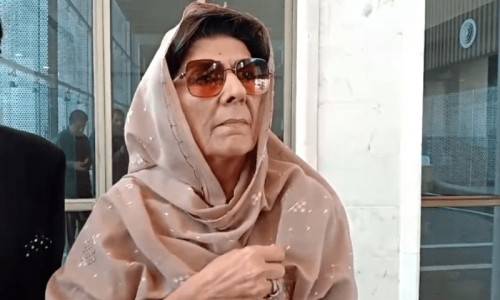ISLAMABAD: The Foreign Office on Friday dismissed international criticism of the crackdown on Pakistan Tehreek-i-Insaf (PTI) protests as ill-informed, but refrained from directly addressing comments by the European Union’s envoy regarding the arrest of journalist Matiullah Jan and the charges against him.
“We have seen some external commentary on recent developments in Pakistan. We believe that much of this commentary is based on an inaccurate and incomplete understanding of the situation,” Foreign Office Spokesperson Mumtaz Zahra Baloch said during the weekly media briefing in response to journalists’ questions.
Security forces, on the night of November 26, quelled PTI protest in the federal capital’s centre, allegedly using excessive force. The PTI claimed that several of its workers were killed during the operation.
Initially, ministers denied any fatalities, but Rana Sanaullah, an adviser to the prime minister, later confirmed in a television interview that five protesters had died.
Terms commentary ‘ill-informed’; says participation of Afghans in political activities is ‘unacceptable’
Amnesty International has since called for a “prompt, thorough, impartial, effective, and transparent” investigation into the deaths, injuries, and alleged unlawful use of force by security personnel. These incidents have also intensified criticism of Pakistan’s political and human rights record, particularly among US lawmakers.
In response to the international concern, Planning Minister Ahsan Iqbal, speaking to foreign media in Islamabad on Thursday, defended the crackdown, asserting, “a procession of armed men engaging in violence couldn’t have been welcomed with a red carpet”.
Domestically, there has been little media scrutiny of PTI’s claims about lethal force and the deaths of its workers.
Matiullah Jan, a journalist investigating these claims, was detained by security personnel on Tuesday night from a city hospital. He was later formally arrested and charged with possessing narcotics and committing terrorism.
Jan’s arrest sparked widespread outrage within Pakistan and abroad, with political leaders, human rights activists, and organisations denouncing the charges as baseless.
In a rare move, EU envoy Riina Kionka weighed in on the issue, citing Article 19 of the International Covenant on Civil and Political Rights, which guarantees the right to “seek, receive, and share information and ideas through any media.” She tweeted, “Where is @Matiullahjan919?”

Interestingly, Kionka also referenced the Generalised Scheme of Preferences Plus (GSP+), a trade incentive programme that grants Pakistan preferential access to EU markets. Pakistan, the largest beneficiary of GSP+, exported goods worth over nine billion euros to the EU under the scheme. To maintain this status, Pakistan is required to implement 27 international conventions, including those related to human rights.
The programme was renewed in 2023 for another four years. However, the fourth biennial review, held last year, raised concerns about the shrinking space for freedom of expression and reported a disturbing trend of violence, disappearances, and curbs on journalists, political activists, and human rights defenders.
The spokesperson, who had a few weeks back sharply reacted to Chinese envoy’s concerns about the security of Chinese citizens, avoided directly responding to Kionka’s comments. Instead, Baloch suggested that the Ministry of Information would be better suited to address Mr Jan’s arrest.
On a separate note, Baloch commented on the arrest of Afghan nationals allegedly involved in the PTI protest, stating: “The participation of foreign nationals in any political activity in Pakistan is unacceptable. We expect all foreigners in Pakistan to respect local laws and customs”. The government claims to have detained 37 Afghan nationals in connection with the protest.
Published in Dawn, November 30th, 2024














































